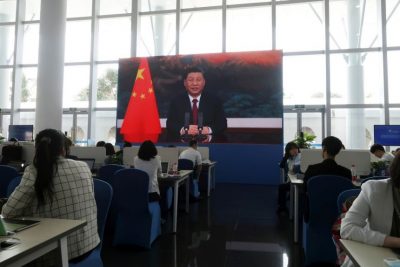Chinese President Highlights the “World Wants Justice” and “Not Hegemony”

All Global Research articles can be read in 51 languages by activating the “Translate Website” drop down menu on the top banner of our home page (Desktop version).
***
Beijing’s foreign policy has traditionally been one of friendly rhetoric, avoidance of controversy, and focussing on cooperation rather than differences. However, with the advent of the COVID-19 pandemic, Chinese diplomatic practices have certainly changed to what has been described by the West as “wolf warrior diplomacy.”
Of course, this is a Western attempt to portray China’s responses to endless allegations and provocations as being aggressive. Long gone are the days of Westerners stereotyping Asians as docile, meek and subservient. For this reason, any response by Beijing to challenges and provocations against it are labelled by Western politicians and media as “wolf warrior diplomacy.”
Chinese President Xi Jinping, in speaking on Tuesday at the annual Boao Forum for Asia, declared that “the world wants justice, not hegemony,” in what was an indirect, but obviously scathing message towards Washington.
Reuters in its report about Xi’s comments wrote that “China has long called for reforms of the global governance system to better reflect a more diverse range of perspectives and values from the international community, including its own, instead of those of a few major nations.”
In effect, what they are describing is Beijing’s efforts to create a Multipolar World Order where the U.S. is no longer the preeminent global power as there is a more equitable distribution of it confined to scopes of influence.
“A big country should look like a big country by showing that it is shouldering more responsibility,” Xi said at the Forum. He also criticised efforts by some countries to “build barriers” and “decouple,” which he said would harm others and benefit no one.
This was once again an indirect reference to the U.S., raising the question on whether Xi’s comments on Tuesday will result in fresh allegations of Chinese “aggression” through its “wolf warrior diplomacy.”
U.S. Secretary of State Antony Blinken and President Joe Biden endlessly accuse Beijing of human rights violations against the Uighur minority in China’s Xinjiang region, cracking down on so-called democracy activists in Hong Kong, threats against Taiwan, and cyberattacks against the U.S. and its allies. Blinken emphasized in March that these supposed actions by China “threaten the rules-based order that maintains global stability. That’s why they’re not merely internal matters, and why we feel an obligation to raise these issues.”
But it is this very emphasis on a “rules-based order” that highlights the U.S.’ contradictory behavior considering its military invasions and interventions outside of international law, as well as endless sanctions and embargoes against Russia, Syria and Venezuela to name but a very few countries. Rather, the so-called “rules-based-order” is a U.S.-led liberal order – the very thing that China is beginning to resist by engaging in so-called “wolf warrior diplomacy” and promoting the idea that the world wants justice and not hegemony, as Xi said.
Although Westerners are still positively reactive to the ideals of “freedom,” “rules” and “liberalism” as mantras that cannot be debated or challenged, these very ideals are endlessly violated by the U.S.’ pursuit to maintain global dominance. As the U.S. was founded on liberalism, it believes it has the moral high ground to patronize and demonize other systems of governance and/or dominant ideologies irrespective of historical, geographical and demographic realities.
Liberalism espouses pragmatism and cooperation, especially through the utilization of international institutes and multilateral formats. This is supposedly in the hope of creating a balanced, peaceful and prosperous world. However, as liberalism drives to shape the world in its own image, it certainly does not shy away from using military power to achieve its goals when necessary, just as the invasion of Iraq demonstrates. It is in this context that Xi highlights that “the world wants justice, not hegemony.”
Despite China pursuing a path of peaceful economic development, it has not prevented endless accusations of human rights violations and challenges against a so-called “rules-based-order.” Rather, China is a major threat to the liberal order as it achieves economic growth and global cooperation despite operating under one party rule. While the U.S. violently destroys countries through pretexts of human rights violations, like it has done in Venezuela and Syria, China demonstrates that such global hegemony is a remnant of the past.
Although “wolf warrior diplomacy” is decried by the West today, it is just a cheap effort to deflect its own provocative diplomacy as an inherently Chinese aggression. Although Chinese diplomatic rhetoric might be crude at times, it is not China militarily engaged across the globe in a desperate attempt to maintain an old hegemonic international system that no longer exists.
*
Note to readers: please click the share buttons above or below. Forward this article to your email lists. Crosspost on your blog site, internet forums. etc.
Paul Antonopoulos is an independent geopolitical analyst.
Featured image is from InfoBrics

